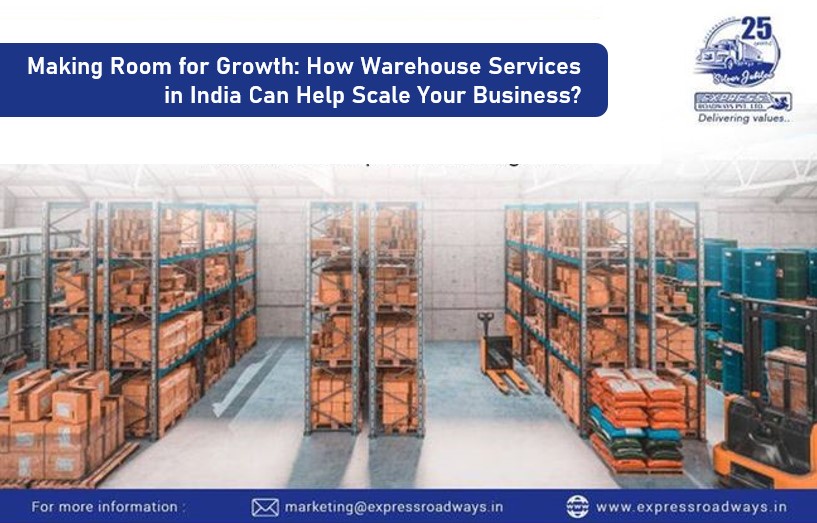
Warehousing is the process of storing goods in a designated space until they are ready for distribution. It is an essential component of the supply chain for businesses across industries. In India, the warehousing industry is witnessing rapid growth, driven by factors such as the rise of e-commerce and the implementation of the Goods and Services Tax (GST).
With the availability of advanced warehouse services in India, businesses can improve their operations and scale their business effectively. For instance, a warehouse in Bhiwandi, a city in Maharashtra, offers modern and cost-effective warehousing solutions that cater to businesses of all sizes. This blog will explore how warehouse services in India can help businesses unlock growth potential.
Understanding Warehouse Services
Warehouse services encompass a range of activities that involve the handling, storage, and distribution of goods. These services can be broadly classified into four types – public, private, contract, and distribution warehouses. Public warehouses offer storage space to businesses for a fee, while private warehouses are owned and operated by individual businesses. Contract warehouses are third-party providers that offer customized services to meet specific client needs, and distribution warehouses specialize in the storage and distribution of goods.
By using warehouse services, businesses can streamline their supply chain and improve inventory management. From the services offered by a warehouse in Bhiwandi or a warehouse in Ahmedabad, you can acquire advanced technologies, such as automated inventory tracking, to ensure efficient operations. Outsourcing warehousing services can also provide businesses with cost savings and flexibility, as they can avoid the high capital expenditure associated with owning and maintaining a warehouse. Instead, they can focus on their core competencies and leave the warehousing activities to the experts.
Evaluating the Indian Warehousing Industry
The Indian warehousing industry is one of the fastest-growing industries in the country. According to industry reports, the Indian warehousing market is expected to grow at a CAGR of 10.5% between 2021 and 2026. The key drivers of growth in the Indian warehousing industry are the rise of e-commerce and the implementation of GST, which has led to the consolidation of warehouses and the emergence of large, modern facilities.
However, the Indian warehousing industry also faces several challenges, such as a lack of standardization and infrastructure. Many warehouses in India still operate with outdated technology and processes, which can lead to inefficiencies and delays. Despite these challenges, the availability of advanced warehouse services in India, including automated storage and retrieval systems and state-of-the-art security systems, is driving the growth of the industry.
Leveraging Warehouse Services in India For Business Growth
By leveraging warehouse services in India, businesses can scale their operations and achieve business growth. The advantages of using warehouse services in India include cost-effectiveness, access to technology, and skilled labor. For example, businesses can take advantage of a warehouse in Ahmedabad, which offers modern and cost-effective warehousing solutions. Businesses using their services can optimize their supply chain, reduce costs, and improve customer service.
Conclusion
Warehouse services in India can provide businesses with cost-effective and efficient solutions for their warehousing needs. Leveraging these services enables businesses to streamline their operations. Therefore, businesses should consider using warehouse services in India to unlock their growth potential.
FAQs:
What is the warehouse receiving process?
The warehouse receiving process is the set of procedures used to receive and process incoming shipments in a warehouse or distribution centre. This includes checking the shipment against the packing list or purchase order, verifying the quantity and condition of the items received, labeling and barcoding the items, and routing them to the appropriate storage location. Effective warehouse-receiving processes help ensure the accuracy, efficiency, and timely delivery of goods.
Also Read: How Technology is Revolutionising Warehouse Operations in India?
What are some safety rules for a warehouse?
Warehouse safety is crucial for protecting workers and preventing accidents and injuries. Some important safety rules for warehouses include:
- Properly training all employees on safety procedures and equipment usage
- Providing and maintaining proper personal protective equipment (PPE)
- Regularly inspecting equipment and tools to ensure they are in good condition
- Maintaining clear and unobstructed aisles and walkways
- Using proper lifting techniques to prevent strain or injury
- Storing hazardous materials in designated areas with proper labelling and signage
- Posting clear and visible safety signs and warnings throughout the warehouse
- Regularly conducting safety audits and reviewing procedures to identify and address potential hazards.
By following these safety rules, warehouse managers can help ensure a safe and healthy working environment for all employees.